- Home
- Judy Blume
Starring Sally J. Freedman as Herself Page 2
Starring Sally J. Freedman as Herself Read online
Page 2
Sally Meets the Stranger
Sally is walking in Union Woods, picking flowers and humming a tune. She is wearing a long, yellow organdy dress and a picture hat to match. Her hair is blowing in the breeze. Suddenly, she is aware of someone following her. She spins around and comes face to face with the strange man. He has a long, shaggy gray beard and a foolish smile on his face. Saliva trickles out of the corners of his mouth. His clothes are tattered and his bare feet are crusted with dirt.
Oh! Sally exclaims and she drops her flowers. The strange man makes terrible noises and Sally tries to run but finds that she can’t. Her feet won’t move. The strange man comes closer and closer. Sally takes off her hat and swats his face with it but since it is made of organdy it doesn’t do any good. He scoops her up and carries her deep into Union Woods.
You’re going to be very sorry! Sally tells him, as he prepares to tie her to a tree. He answers, Ugr harmph vilda phud, then laughs as he winds the rope tighter and tighter around Sally’s small body.
But he is so strange he forgets to tie the two ends of the rope together and as soon as he goes back to his hut Sally wiggles free and runs. She doesn’t stop until she reaches police headquarters, where she tells her story to the Chief of Police himself. Then she leads him and two of his assistants to the strange man’s hut. The strange man is captured at last! Never again will he be able to tie a girl to a tree.
The Chief of Police is so impressed that he makes Sally his number one detective, specializing in strange cases. A Hollywood producer decides to make a movie of Sally’s story. But he can’t find the right ten-year-old girl to play the lead. He decides he must have Sally herself and that is how Sally gets to be not only a famous detective but also a movie star.
Sometime that night Douglas came home from the hospital. Sally woke to her parent’s voices. Mom cried, “His clothes are wet … my God, Arnold, he’s soaked right through.”
“From the brook,” Daddy said. “He fell into the brook … remember?”
“But the hospital …” Mom said, “how could they have left him in these wet clothes for so long … he’ll get pneumonia or something … I knew I should have gone too.”
Douglas didn’t get pneumonia, he got nephritis, a kidney infection. He was very sick and had to stay in bed. Nobody could prove it came from being wet for such a long time but Sally knew that’s what her mother was thinking.
Ma Fanny moved into the spare room to help Mom take care of Douglas. And Aunt Bette came over every day after school. She made charts and taped them to the wall in his room. One to keep track of his medicines, another to record his temperature, and a third, showing how many glasses of water he drank each day. If they added up to a quart or more Mom pasted a gold star on that chart at night. Every Thursday afternoon a lab technician would arrive to take some blood from Douglas’s arm. Sally wasn’t allowed to watch, although she wanted to very much.
Nobody worried about Douglas missing school because he was a genius. He’d skipped third grade which made him the youngest student in eighth. When he was ten he’d built a radio by himself. There wasn’t anything he couldn’t fix or make from scratch. Still, Sally was glad she wasn’t a genius too because Daddy and Mom were never satisfied with Douglas’s report card. He didn’t get all A’s or even all B’s like Sally. And his teachers always said the same thing about him. “Douglas does not work up to his full potential.”
The weather was hot and sticky that May. After school Sally and her best friend, Christine, played together.
“Why can’t I see Douglas?” Christine asked Sally.
“Because my mother doesn’t want him to get any new germs.”
“I don’t have any new germs and besides, I don’t want to touch him or anything … I just want to see him.”
“Maybe next week … I’m not allowed in there myself.”
“Does he look awful?”
“Sort of …”
“Did you sign his cast?”
“Not yet … I just told you I’m not allowed to get that close … but when I do sign it I’m going to draw a Kilroy Was Here picture with my name across the brick wall.”
“Let’s play Cowgirl today,” Christine said. “I’m sick of Detective.”
“But we played Cowgirl yesterday and besides, I’ve got this really great detective story ready …” Sally said. “We’re after this murderer who cuts people up and stuffs the pieces into brown lunch bags … he leaves the bags all over town and the people are really scared … this is no ordinary murderer … this guy is dangerous.”
“Why do you always get to make up the story?” Christine asked.
“Because I’m good at it,” Sally said. “I’ll be in charge of the case and you can be my assistant …”
“You were in charge yesterday,” Christine said.
“That was different … that was Cowgirl …”
“I’ll only play if we can be partners,” Christine said.
“Okay … we’re partners.”
“Good.”
For a while Douglas seemed to be getting better and they made plans to rent a house at Bradley Beach for the summer. Then he got sick all over again and they cancelled their vacation. Mom and Daddy and Ma Fanny spoke in whispers and Sally began to wonder if Douglas might die. If he did she’d be an only child. She could have his bicycle. It was bigger than hers. But then she’d have to learn to ride a boy’s bike.
Anyway, she didn’t want him to die. And she knew she shouldn’t be thinking that way. God could punish her for such evil thoughts. Besides, if Douglas died it wouldn’t be fun like when her aunts and uncles and Granny Freedman had died. After their funerals they’d sat shivah for a week, at Sally’s house. It was a Jewish custom, to help the family through those difficult first days following a loved one’s death. Sally enjoyed sitting shivah very much. Every afternoon and evening friends and relatives would come to visit, bringing baskets of fruit and homemade cakes and cookies and boxes of candy from Barton’s. And they would pinch Sally’s cheeks, telling her how much she’d grown since the last funeral. Then they’d all sit around and talk and Mom would serve coffee. And as they left they’d always say, “We must get together on happier occasions.” But they never did.
It seemed to Sally that somebody in her family was always dying. But they were much older or very sick and she didn’t know them well enough to really care. The last time they’d sat shivah was in November when Ma Fanny got a letter telling her that Tante Rose and Lila were dead—killed in one of Hitler’s concentration camps. And people who Sally had never seen before came to pay condolence calls. People from the old country, who had known Ma Fanny when she was just a girl, before she sailed to America on the banana boat. People who remembered Tante Rose and Lila.
With Douglas it would be different. It wouldn’t be like a party at all. Everyone would cry and they would forget all about her. It would be even worse than now. She wished Douglas would hurry and get well so the family could have some time for her too.
When school ended Sally was sent to Day Camp at the Y. And in August Douglas was well again. Toward the end of the month Mom said, “Daddy and I are going away for a few days.”
“Where to?” Sally asked. “Bradley Beach?”
“No … Florida … Ma Fanny will take care of you and Douglas while we’re gone.”
“But suppose Douglas gets sick again?”
“He won’t … the doctor says he’s doing fine and we’ll just be gone a week … maybe less.”
“How will you get there?”
“On the train.”
“But Florida’s very far, isn’t it?”
“It’s a day and a half on the train.”
Sally thought she might start to cry but she wasn’t sure why.
“Don’t look like that,” Mom said, putting an arm around her. “Everything’s going to be fine … and when we come home we may have a big surprise for you.”
“What kind of surprise?”
“If I
tell you then it won’t be a surprise.”
“Tell me anyway … please …”
“Can you promise to keep it a secret?’
“I promise …”
“You won’t tell anybody?”
Sally shook her head.
“Well … Daddy and I are going to look for an apartment in Miami Beach and if we find one then maybe we’ll spend next winter there … and wouldn’t that be fun?”
“You mean all of us?”
“You and Douglas and Ma Fanny and me … Daddy would have to stay at home to work, of course …”
“But what about school?”
“You’d go to school there … wouldn’t that be exciting?”
“I don’t know.”
“The doctors think it would be very good for Douglas … and you always have sore throats in the winter … so it would be good for you too.”
“Sometimes I get sore throats in the summer … remember the night the war was over … remember how my throat hurt then?”
“Yes, but winter is worse … and we don’t want Douglas to be sick anymore, do we?”
“You just said he’s fine.”
“He’s getting better …”
“You said fine.”
“I meant the infection is clearing up … but Douglas is very run-down … he’s lost a lot of weight … you can see his ribs …”
“You always could.”
“But now you can count them … he needs time to recuperate …”
“I’m not sure I want to go.”
“Well … nothing’s definite … we’ll just see what happens, okay?”
“Okay.”
Sally and her friends were in the playhouse in Sally’s backyard. It wasn’t a baby kind of playhouse for dolls. It was a big sturdy house that her father and Douglas had built. It was painted white with green shutters. Inside there was a table, four chairs, a built-in wooden bed and three windows. There was a Dutch door, too.
Alice Ingram, who had a recreation room and four telephones at her house, didn’t have anything to compare with Sally’s playhouse. Alice and Christine were both in Sally’s class at school. They sat next to each other on the wooden bed. Betsy, who lived across the street, was a year younger than the other girls but two heads taller. She sat on one of the chairs.
“Let’s play Love and Romance today,” Alice said. “Sally and Betsy can be the boys and me and Christine will be the girls.”
“No thank you,” Betsy said. “I was the boy last time.”
“That’s because you’re so tall,” Christine told her. “You make a good boy.”
“Let’s play War instead,” Sally suggested.
“Oh, I’m sick of playing War,” Alice said. “I always wind up being Hitler!”
“Well, you can’t expect me to be Hitler,” Sally said. “I’m Jewish.”
“So … everybody expects me to be the boy and I’m really a girl,” Betsy argued.
“That’s different!” Sally said. “But if you don’t want to play War I have another idea …”
“What?” Alice Ingram asked.
“We can play Concentration Camp instead. And nobody has to be Hitler because he is away on business.”
“How do you play?” Betsy asked.
“The usual way …” Sally answered. “First I tell you who you are and then I make up the story … Alice, you can be Lila …”
“Who’s she?” Alice asked.
“This beautiful woman who gets captured and sent to Dachau.”
“What’s that?” Alice asked.
“It’s the concentration camp where the story takes place.”
“Oh.”
“And Betsy, you can be Tante Rose, Lila’s mother …”
“Why should I have to be Alice’s mother … I’m younger …”
“Because you’re taller … now just shut up and listen …”
“I don’t see why we always have to play Sally’s stories,” Betsy whined.
“Because she’s good at making them up,” Christine said. “And besides, it’s her playhouse.”
“I’ll play,” Alice said, “as long as I can be Lila … you did say she was beautiful, didn’t you?”
“Yes, very … we’ve got pictures of her. She has long, dark hair and big eyes.”
“Is her mother beautiful too?” Betsy asked.
“Of course. And she’s not even that old because she had Lila when she was just sixteen.”
“My sister’s sixteen,” Betsy said.
“I know … I know …” Sally was anxious to get on with the game.
“Who am I supposed to be?” Christine asked.
“You can be the concentration camp guard. You hand the pretend soap to Tante Rose and Lila and tell them to go to the showers.”
“Why do they get pretend soap?”
“Because it’s a trick. They’re not really going to get showers, they’re going to get killed in a big gas oven.”
“I’m going home,” Betsy said. “I don’t like this game.”
“It is kind of scary,” Christine said. “I’d rather play Love and Romance.”
“If we do, then I’ll stay,” Betsy said.
“Let’s take a vote,” Christine said. “All in favor of Concentration Camp, raise your hands.”
Sally and Alice raised their hands.
“All in favor of Love and Romance, raise yours …” Christine and Betsy raised theirs. “It’s a tie.”
“Oh, all right …” Sally said, “we’ll play Detective instead. That way nobody wins.”
Later, after Alice and Betsy went home, Christine and Sally sat on the glider swing. “How long will your parents be in Florida?” Christine asked.
“A week … they’re looking for an apartment.”
“You’re moving?”
“No, silly … I’d never move … it’s just for next winter … so Douglas doesn’t get sick in the cold weather. And if you tell anybody anything about it I’ll kill you … it’s supposed to be a secret.”
“Who would I tell?”
“I don’t know … just promise that you won’t.”
“Okay … I promise … I’ve got to go now …”
Sally walked Christine to her bicycle.
“You know who goes to Florida in the winter?” Christine aked.
“No … who?”
“Millionaires! I read it in my mother’s magazine.” She coasted down Sally’s driveway.
“Hey … my father’s just a dentist,” Sally called, “not a millionaire …”
Christine laughed and waved.
“Hey … remember your promise … not a word to anyone.”
“My lips are sealed,” Christine called back.
Bounce … catch … bounce … catch … Sally was tossing her Spalding ball against the side of the house. The supper that Ma Fanny was cooking smelled good. Sally guessed it was roast chicken. Bounce … catch … bounce … catch … She had time for just a short story before Ma Fanny called her in to eat. At least when she made up the stories inside her head she didn’t have to worry about who would play what. That was such a waste of time. Let’s see, Sally thought, thinking up a title.
Sally Saves Lila
It is during the war. President Roosevelt asks for volunteers to go to Europe to help.
Sally is the first on line.
How old are you? the Head of Volunteers asks.
I’m ten, Sally tells her, but I’m smart … and strong … and tough.
Yes, I can see that, the Head says. Okay, I’m going to take a chance and send you … your ship leaves in an hour.
Thank you, Sally says, you won’t be sorry you chose me.
Good luck, the Head says.
Sally salutes, slings her duffle bag over her shoulder and boards her ship.
When she arrives in Europe she realizes she has forgotten her toothpaste. She goes into the first Rexall’s she sees and selects a tube of Ipana, for the smile of beauty. Then she feels hungry. It must be
lunchtime. She finds a deli and orders a salami sandwich on rye and a Coke to go. She takes her lunch to the park across the street and finds a sunny bench. She unwraps her sandwich but before she takes her first bite she hears someone crying.
Sally investigates. After all, she has come to Europe to help. It is a woman, huddled on the ground next to a tall tree. Her hands cover her face, muffling her sobs. She is dressed in rags.
Sally goes to her side. Are you hungry? she asks.
The woman does not respond so Sally holds out her sandwich. It’s salami, she says. Doesn’t it smell good?
Kosher? the woman asks.
Yes, Sally tells her. Kosher salami is the only kind I like.
Me too, the woman says. She reaches for the sandwich and wolfs it down, her back to Sally.
How long has it been since you’ve eaten? Sally asks.
Days … weeks … months … I don’t know anymore.
Where do you live?
I have no home … no family … no friends … all gone … gone … Finally she turns around and faces Sally. Even though her hair is filthy and her big eyes are red and swollen and most of her teeth are missing, Sally knows her instantly. Lila!
At the sound of her name the woman tries to stand up and run but she is so weak she falls to the ground, beating it with her fists. I knew you would catch me … sooner or later … I knew I could never escape … but I won’t go back to Dachau … not ever … I’ll die right here … right now … She pulls a knife from her pocket and aims it at her heart.
No! Sally says, springing to her feet. She wrestles the knife away from Lila. You don’t understand … I’m here to help …
You are not with the Gestapo? Lila asks.
No, I’m with the Volunteers of America. I’m Sally J. Freedman, from New Jersey … I’m your cousin, once removed …
You mean you’re Louise’s daughter?
Sally nods.
You mean you’re Tante Fanny’s granddaughter?
Sally nods again.
I can’t believe it … I can’t believe it … just when I’d given up all hope. Sally and Lila embrace.
Where’s Tante Rose? Sally asks.

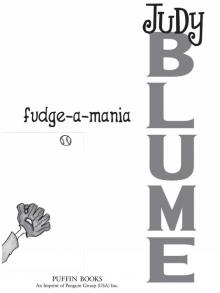 Fudge-a-Mania
Fudge-a-Mania Starring Sally J. Freedman as Herself
Starring Sally J. Freedman as Herself Blubber
Blubber Otherwise Known as Sheila the Great
Otherwise Known as Sheila the Great Are You There God? It's Me, Margaret
Are You There God? It's Me, Margaret Wifey
Wifey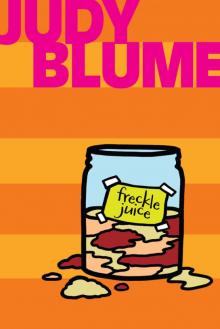 Freckle Juice
Freckle Juice Just as Long as We're Together
Just as Long as We're Together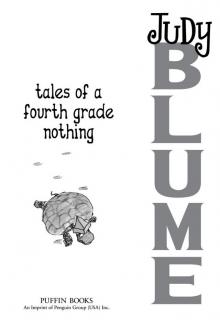 Tales of a Fourth Grade Nothing
Tales of a Fourth Grade Nothing Summer Sisters
Summer Sisters Then Again, Maybe I Won't
Then Again, Maybe I Won't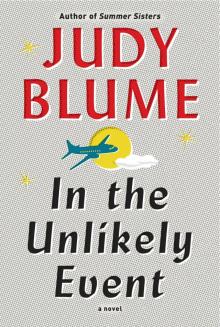 In the Unlikely Event
In the Unlikely Event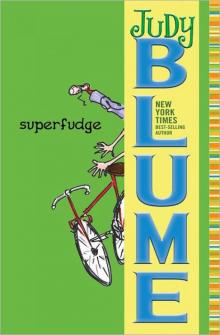 Superfudge
Superfudge Forever . . .
Forever . . .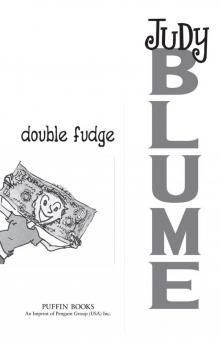 Double Fudge
Double Fudge BFF*
BFF* Smart Women
Smart Women It's Not the End of the World
It's Not the End of the World Going, Going, Gone! with the Pain and the Great One
Going, Going, Gone! with the Pain and the Great One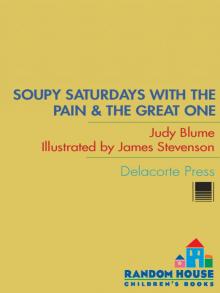 Soupy Saturdays with the Pain and the Great One
Soupy Saturdays with the Pain and the Great One Cool Zone with the Pain and the Great One
Cool Zone with the Pain and the Great One Iggie's House
Iggie's House Friend or Fiend? with the Pain and the Great One
Friend or Fiend? with the Pain and the Great One